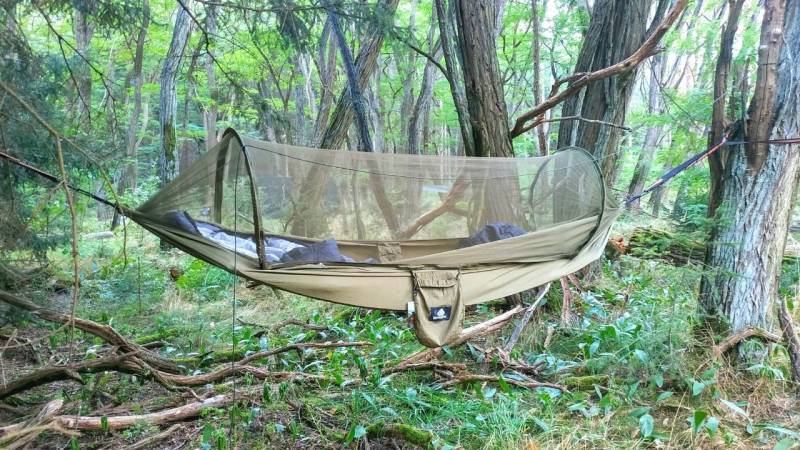
hammock
Nomen
Meaning
A hammock is a suspended bed or chair made of fabric or netting, typically hung between two trees or other sturdy supports. In the context of survival, bushcraft, and outdoor activities such as camping and hiking, a hammock is a lightweight and portable sleeping option that offers comfort and protection from the ground. It allows you to sleep off the cold, damp, or uneven terrain, providing a more restful and comfortable night's sleep. Hammocks are popular among outdoor enthusiasts due to their versatility, ease of setup, and the ability to enjoy nature while suspended above the ground.

Examples
„I love setting up my hammock between two trees and relaxing in nature.“
„When I go camping, I always bring my hammock with me for a comfortable sleep under the stars.“
„Hanging my hammock in the backyard is the perfect way to unwind after a long day.“
„My friends and I often gather around the campfire, sharing stories while swaying in our hammocks.“
„Exploring the wilderness becomes even more enjoyable when I can take breaks and rest in my hammock.“
Origin
The word "hammock" originates from the Taino language, which was spoken by the indigenous people of the Caribbean islands. The Taino word for a fishing net, "hamaca," is believed to be the root of the modern term "hammock."
When European explorers encountered the Taino people and their unique sleeping apparatus, they adopted the word and brought it back to Europe. The concept of a suspended bed quickly gained popularity among sailors and explorers, as it provided a comfortable and secure sleeping arrangement while on long voyages.
Over time, hammocks became widely used in tropical regions around the world, particularly in areas with limited space or where the ground was unsuitable for sleeping. They were also favored by military forces, as they offered a portable and elevated sleeping option that protected soldiers from insects and damp ground.
Today, hammocks are not only associated with relaxation and leisure but also with outdoor activities such as camping, hiking, and survival. They have evolved to include various designs, materials, and accessories, making them a versatile and popular choice for outdoor enthusiasts.
Historical and cultural importance
A hammock is a type of suspended bed or sleeping surface that is typically made of fabric or netting and hung between two trees or other supports. It has a long history and cultural significance in various parts of the world.
The hammock originated in Central and South America, where it was used by indigenous peoples for centuries as a practical and comfortable sleeping solution. It provided protection from insects and snakes on the ground, as well as a cool and elevated sleeping surface in hot and humid climates.
In Caribbean cultures, hammocks have been an integral part of daily life for centuries. They were used by sailors and pirates as a space-saving and comfortable sleeping option on ships. In tropical regions, hammocks are still commonly used as a primary sleeping arrangement, especially in rural areas where beds may be scarce or impractical.
The hammock also holds cultural significance in other parts of the world. In Brazil, for example, the hammock is a symbol of relaxation and leisure, often associated with the laid-back beach lifestyle. In the United States, hammocks are popular for camping and outdoor recreation, representing a connection to nature and a sense of adventure.
Today, hammocks are enjoyed by people of all ages and backgrounds around the world. They are not only used for sleeping, but also for lounging, reading, and enjoying the outdoors. The versatility and comfort of hammocks make them a beloved piece of outdoor furniture and a symbol of relaxation and escape from the stresses of modern life.
More information about the term hammock
The Hammock: A Comfortable and Versatile Shelter Option
When it comes to outdoor adventures and survival situations, having a reliable and comfortable shelter is essential. While tents are a popular choice, there is another option that offers a unique blend of comfort, versatility, and portability - the hammock.
Comfort and Relaxation in the Wilderness
One of the biggest advantages of using a hammock as a shelter is the unparalleled comfort it provides. Unlike sleeping on the hard ground, a hammock allows you to sleep suspended in the air, cradled by the gentle sway of the fabric. This not only provides a more comfortable sleeping experience but also helps alleviate pressure points and promotes better blood circulation.
Furthermore, a hammock offers a unique sense of relaxation and tranquility. Imagine lying back, gazing up at the stars, and feeling the gentle breeze against your skin. It's a truly immersive experience that allows you to connect with nature on a deeper level.
Portability and Versatility
Another major advantage of hammocks is their portability. Unlike tents, hammocks are lightweight and compact, making them easy to carry on your outdoor adventures. They can be folded into a small pouch and easily attached to your backpack, taking up minimal space.
Additionally, hammocks can be set up in a variety of environments, making them incredibly versatile. Whether you're camping in the dense forest, exploring the mountains, or even spending a night on a beach, a hammock can be easily hung between two sturdy trees, providing you with a comfortable and secure shelter option.
Protection from the Elements
While hammocks may not offer the same level of protection from the elements as a tent, they can still provide adequate shelter in most weather conditions. By using a tarp or rainfly, you can create a protective barrier above your hammock, shielding you from rain, wind, and even snow.
Furthermore, hammocks can be easily elevated off the ground, keeping you safe from crawling insects, snakes, and other potential hazards. This elevated position also helps to keep you dry in wet conditions, as water will simply run off the sides of the hammock.
Conclusion
Whether you're a seasoned outdoor enthusiast or a survivalist, a hammock is a valuable addition to your gear. Its comfort, portability, and versatility make it an excellent choice for anyone looking to experience the wilderness in a unique and enjoyable way. So next time you head out into the great outdoors, consider leaving the tent behind and opting for the cozy embrace of a hammock.
Back to overview

